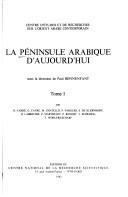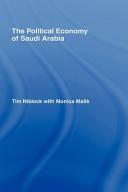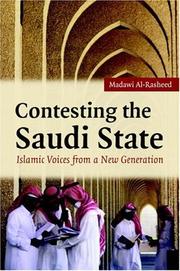| Listing 1 - 10 of 19 | << page >> |
Sort by
|

ISBN: 2222028221 2222029473 2271081297 2271081289 9782222028222 9782222029472 Year: 1982 Publisher: Institut de recherches et d’études sur les mondes arabes et musulmans
Abstract | Keywords | Export | Availability | Bookmark
 Loading...
Loading...Choose an application
- Reference Manager
- EndNote
- RefWorks (Direct export to RefWorks)
Voici le second tome de la péninsule Arabique d’aujourd’hui, ouvrage collectif s’adressant au public non spécialiste mais désireux de prendre une connaissance attentive de cette région du monde arabe, placée chaque jour au cœur de l’actualité économique, financière, stratégique, diplomatique et religieuse. Le tome I a tenté une présentation systématique de la péninsule prise dans son ensemble. Le tome II, Études par pays, offre, comme son nom l’indique, vingt-deux études sur les divers États de la péninsule Arabique. Elles sont regroupées en quatre ensembles : l’Arabie du Sud, le sultanat d’Oman, les États du Golfe et l’Arabie Saoudite. La présentation de chaque pays est accompagnée d’une carte et d’une chronologie, pour permettre au lecteur de le situer d’une orientation bibliographique. Nous espérons que ces études suggèreront la diversité géographique, historique, religieuse, économique et culturelle de cette région, une des plus mal connues du monde arabe.
Saudi Arabia. --- Arabie Saoudite --- Saudi Arabia --- Arabia saudita --- ʻArabīyah as Saʻūdīyah --- ʻArav ha-Saʻudit --- Hejaz and Nejd --- Kingdom of Saudi Arabia --- Mamlaka al-ʻArabiya as-Saʻudiya --- Mamlakah al-ʻArabīyah al-Saʻūdīyah --- Reino de Arabia Saudi --- Saudiarabien --- Saudovskai︠a︡ Aravii︠a︡ --- Sauji Arabia --- Saujiarabia --- Sha-tʻse A-la-po --- ערב הסעודית --- サウディ・アラビア --- サウジアラビア --- Hejaz (Kingdom) --- Arabie --- Dubaï (Dubayy) --- Koweit (Kuwait) --- Bahrein (Bahrain) --- Qatar --- Yémen --- Émirats arabes unis --- Oman (sultanat) --- Péninsule arabique --- Arabie saoudite

ISBN: 0700717293 020303757X 1136132740 128371177X 1138362115 9781136132742 9780203037577 9780700717293 9781136132827 9781136132902 1136132821 Year: 2004 Volume: 1 Publisher: London ; New York : RoutledgeCurzon,
Abstract | Keywords | Export | Availability | Bookmark
 Loading...
Loading...Choose an application
- Reference Manager
- EndNote
- RefWorks (Direct export to RefWorks)
The changing political situation in the Middle East poses challenges for the economies of the region, and some see none more vulnerable to collapse than Saudi Arabia's. Yet as this study demonstrates, the fundamentals of the Kingdom's economy are relatively robust, as over three quarters of GDP is accounted for by the non-oil sector, and impressive modern industries have been established, notably in petrochemicals. The financial system functions well, and despite substantial government debts, there is low inflation and currency stability. The private sector increasingly drives the economy, alt
Globalization --- -330.9538 --- Global cities --- Globalisation --- Internationalization --- International relations --- Anti-globalization movement --- Economic aspects --- -Saudi Arabia --- Saudi Arabia --- Economic conditions --- -Economic policy. --- Hejaz and Nejd --- Kingdom of Saudi Arabia --- Arabia saudita --- Sha-tʻse A-la-po --- Mamlakah al-ʻArabīyah al-Saʻūdīyah --- ʻArabīyah as Saʻūdīyah --- Saudovskai︠a︡ Aravii︠a︡ --- Mamlaka al-ʻArabiya as-Saʻudiya --- Reino de Arabia Saudi --- Economic policy. --- Saudiarabien --- ערב הסעודית --- ʻArav ha-Saʻudit --- サウジアラビア --- Sauji Arabia --- Saujiarabia --- サウディ・アラビア --- Hejaz (Kingdom)
Book
ISBN: 1350988936 1838609520 9781838609528 9781784536824 9781350988934 1784536822 9781784536824 9781838609511 1838609512 Year: 2016 Publisher: London : I.B. Tauris,
Abstract | Keywords | Export | Availability | Bookmark
 Loading...
Loading...Choose an application
- Reference Manager
- EndNote
- RefWorks (Direct export to RefWorks)
"In the wake of September 11th instant theories have emerged that try to root Osama Bin Laden's attacks on Wahhabism. Muslim critics have dismissed this conservative interpretation of Islam that is the official creed of Saudi Arabia as an unorthodox innovation that manipulated a suggestible people to gain political influence. David Commins' book questions this assumption. He examines the debate on the nature of Wahhabism, and offers original findings on its ascendance in Saudi Arabia and spread throughout other parts of the Muslim world such as Afghanistan and Pakistan. He also assesses the challenge that radical militants within Saudi Arabia pose to the region, and draws conclusions which will concern all those who follow events in the Kingdom. The Wahhabi Mission and Saudi Arabia is essential reading for anyone interested in the Middle East and Islamic radicalism today."--Bloomsbury Publishing.
Islam and state --- Wahhābīyah --- Radicalism --- Wahhabiyah --- Saudi Arabia --- Religion. --- Extremism, Political --- Ideological extremism --- Political extremism --- Political science --- Arabia saudita --- ʻArabīyah as Saʻūdīyah --- ʻArav ha-Saʻudit --- Hejaz and Nejd --- Kingdom of Saudi Arabia --- Mamlaka al-ʻArabiya as-Saʻudiya --- Mamlakah al-ʻArabīyah al-Saʻūdīyah --- Reino de Arabia Saudi --- Saudiarabien --- Saudovskai︠a︡ Aravii︠a︡ --- Sauji Arabia --- Saujiarabia --- Sha-tʻse A-la-po --- ערב הסעודית --- サウディ・アラビア --- サウジアラビア --- Hejaz (Kingdom)
Book
ISBN: 019024450X 0199365288 0199365407 0199330646 1306260159 9780199365401 9780199365289 9780199330645 Year: 2013 Publisher: Oxford
Abstract | Keywords | Export | Availability | Bookmark
 Loading...
Loading...Choose an application
- Reference Manager
- EndNote
- RefWorks (Direct export to RefWorks)
"Noted Gulf expert Christopher Davidson contends that the collapse of these kings, emirs, and sultans is going to happen, and was always going to"--
Monarchy --- Kingdom (Monarchy) --- Executive power --- Political science --- Royalists --- Persian Gulf States --- Saudi Arabia --- Arabia saudita --- ʻArabīyah as Saʻūdīyah --- ʻArav ha-Saʻudit --- Hejaz and Nejd --- Kingdom of Saudi Arabia --- Mamlaka al-ʻArabiya as-Saʻudiya --- Mamlakah al-ʻArabīyah al-Saʻūdīyah --- Reino de Arabia Saudi --- Saudiarabien --- Saudovskai︠a︡ Aravii︠a︡ --- Sauji Arabia --- Saujiarabia --- Sha-tʻse A-la-po --- ערב הסעודית --- サウディ・アラビア --- サウジアラビア --- Hejaz (Kingdom) --- Politics and government
Book
ISBN: 1597976881 1597978760 9781597978767 9781597976886 Year: 2012 Publisher: Washington, D.C.
Abstract | Keywords | Export | Availability | Bookmark
 Loading...
Loading...Choose an application
- Reference Manager
- EndNote
- RefWorks (Direct export to RefWorks)
Of all the countries in the world that are vital to the strategic and economic interests of the United States, Saudi Arabia is the least understood by the American people. Saudi Arabia's unique place in Islam makes it indispensable to a constructive relationship between the non-Muslim West and the Muslim world. For all its wealth, the country faces daunting challenges that it lacks the tools to meet: a restless and young population, a new generation of educated women demanding opportunities in a closed society, political stagnation under an octogenarian leadership, religious extremism and inte
United States --- Saudi Arabia --- Relations --- Economic conditions --- Social conditions --- Politics and government --- Arabia saudita --- ʻArabīyah as Saʻūdīyah --- ʻArav ha-Saʻudit --- Hejaz and Nejd --- Kingdom of Saudi Arabia --- Mamlaka al-ʻArabiya as-Saʻudiya --- Mamlakah al-ʻArabīyah al-Saʻūdīyah --- Reino de Arabia Saudi --- Saudiarabien --- Saudovskai︠a︡ Aravii︠a︡ --- Sauji Arabia --- Saujiarabia --- Sha-tʻse A-la-po --- ערב הסעודית --- サウディ・アラビア --- サウジアラビア --- Hejaz (Kingdom)
Book
ISBN: 9780521761284 9780521747547 9780511993510 9781139775847 1139775847 1139781871 9781139781879 051199351X 052176128X 0521747546 1316087700 1139778889 1107253519 1283715740 113977736X Year: 2014 Publisher: Cambridge Cambridge University Press
Abstract | Keywords | Export | Availability | Bookmark
 Loading...
Loading...Choose an application
- Reference Manager
- EndNote
- RefWorks (Direct export to RefWorks)
"This updated edition analyses the challenges, both internal and external, facing Saudi Arabia in the twenty-first century. Two new chapters discuss the political, economic and social developments in the aftermath of 9/11, painting a vivid picture of a country shocked by terrorism and condemned by the international community. Madawi Al-Rasheed reveals that fragmentation of royal politics, a failing economy and fermenting Islamist dissent posed serious threats to state and society in 2001. She assesses the consequent state reforms introduced under pressure of terrorism, international scrutiny and a social mobilisation of men, women and minorities struggling to shape their future against a background of repression and authoritarian rule. While Saudi Arabia is still far from establishing a fourth state, there are signs that the people are ready for a serious change that will lead them to a state of institutions rather than princes"--Provided by publisher.
908 <532> --- Heemkunde. Area studies--Saoedi-Arabië --- Saudi Arabia --- History --- 908 <532> Heemkunde. Area studies--Saoedi-Arabië --- Hejaz and Nejd --- Kingdom of Saudi Arabia --- Arabia saudita --- Sha-tʻse A-la-po --- Mamlakah al-ʻArabīyah al-Saʻūdīyah --- ʻArabīyah as Saʻūdīyah --- Saudovskai︠a︡ Aravii︠a︡ --- Mamlaka al-ʻArabiya as-Saʻudiya --- Reino de Arabia Saudi --- Saudiarabien --- ערב הסעודית --- ʻArav ha-Saʻudit --- サウジアラビア --- Sauji Arabia --- Saujiarabia --- サウディ・アラビア --- Hejaz (Kingdom) --- History of Asia --- anno 1900-1999 --- anno 2000-2009 --- Saudi-Arabia --- Arts and Humanities

ISBN: 9780415428422 0415428424 9780415428439 0415428432 9780203946190 0203946197 1134088949 1281062847 9786611062842 9781134088898 9781134088935 9781134088942 Year: 2007 Publisher: London New York Routledge
Abstract | Keywords | Export | Availability | Bookmark
 Loading...
Loading...Choose an application
- Reference Manager
- EndNote
- RefWorks (Direct export to RefWorks)
With Saudi Arabia being of immense importance both politically and economically in the Middle East, this book provides a much needed, broad ranging survey of the development of the Saudi economy from the 1960s to the present day. Written by a highly reputable author, the book includes an analysis of how political and social factors have shaped policy, and how the Saudi state is coping with the dynamics of a rapidly changing economic and political situation.
Saudi Arabia --- Economic conditions --- Social conditions --- 331.30 --- 331.31 --- SA / Saudi Arabia - Saoedi Arabië - Arabie Saoudite --- 330.9538 --- Economische toestand. --- Economisch beleid. --- Economic conditions. --- Social conditions. --- Economische toestand --- Economisch beleid --- History. --- Economic policy. --- Arabia saudita --- ʻArabīyah as Saʻūdīyah --- ʻArav ha-Saʻudit --- Hejaz and Nejd --- Kingdom of Saudi Arabia --- Mamlaka al-ʻArabiya as-Saʻudiya --- Mamlakah al-ʻArabīyah al-Saʻūdīyah --- Reino de Arabia Saudi --- Saudiarabien --- Saudovskai︠a︡ Aravii︠a︡ --- Sauji Arabia --- Saujiarabia --- Sha-tʻse A-la-po --- ערב הסעודית --- サウディ・アラビア --- サウジアラビア --- Hejaz (Kingdom) --- Saudi Arabia - Economic conditions --- Saudi Arabia - Social conditions
Periodical
ISSN: 16584287 Year: 1990 Publisher: Jeddah : Scientific Pub. Centre, King Abdulaziz University,
Abstract | Keywords | Export | Availability | Bookmark
 Loading...
Loading...Choose an application
- Reference Manager
- EndNote
- RefWorks (Direct export to RefWorks)
Meteorology --- Environmental sciences --- Arid regions agriculture --- Saudi Arabia --- Climate --- Dryland agriculture --- Dryland farming --- Environmental science --- Hejaz and Nejd --- Kingdom of Saudi Arabia --- Arabia saudita --- Sha-tʻse A-la-po --- Mamlakah al-ʻArabīyah al-Saʻūdīyah --- ʻArabīyah as Saʻūdīyah --- Saudovskai︠a︡ Aravii︠a︡ --- Mamlaka al-ʻArabiya as-Saʻudiya --- Reino de Arabia Saudi --- Arid regions agriculture. --- Climatology. --- Environmental sciences. --- Meteorology. --- Saudi Arabia. --- Agriculture --- Crop zones --- Desert reclamation --- Science --- Saudiarabien --- ערב הסעודית --- ʻArav ha-Saʻudit --- サウジアラビア --- Sauji Arabia --- Saujiarabia --- サウディ・アラビア --- Hejaz (Kingdom) --- Aerology --- Earth sciences --- Atmosphere --- Climate science --- Science of climate --- Saudovskai͡a Aravii͡ --- Atmospheric science --- Climate sciences

ISBN: 0521858364 9780521858366 9780511492181 9780511270154 0511270151 0511269595 9780511269592 0511266731 9780511266737 0511268653 9780511268656 0511492189 9786610750504 6610750505 1107166969 9781107166967 1280750502 9781280750502 0511319428 9780511319426 051126867X Year: 2007 Volume: 25 Publisher: Cambridge Cambridge University Press
Abstract | Keywords | Export | Availability | Bookmark
 Loading...
Loading...Choose an application
- Reference Manager
- EndNote
- RefWorks (Direct export to RefWorks)
The terms Wahhabi or Salafi are seen as interchangeable and frequently misunderstood by outsiders. However, as Madawi al-Rasheed explains in a fascinating exploration of Saudi Arabia in the twenty-first century, even Saudis do not agree on their meaning. Under the influence of mass education, printing, new communication technology, and global media, they are forming their own conclusions and debating religion and politics in traditional and novel venues, often violating official taboos and the conservative values of the Saudi society. Drawing on classical religious sources, contemporary readings and interviews, Al-Rasheed presents an ethnography of consent and contest, exploring the fluidity of the boundaries between the religious and political. Bridging the gap between text and context, the author also examines how states and citizens manipulate religious discourse for purely political ends, and how this manipulation generates unpredictable reactions whose control escapes those who initiated them.
Islam and politics --- Islam et politique --- Saudi Arabia --- Arabie Saoudite --- Social life and customs --- Politics and government --- Moeurs et coutumes --- Politique et gouvernement --- Social change --- Islam --- Sociology of culture --- Saudi-Arabia --- Dissenters --- Political culture --- Culture --- Political science --- Dissidents --- Nonconformists --- Rebels (Social psychology) --- Conformity --- Intellectual life --- Arabia saudita --- ʻArabīyah as Saʻūdīyah --- ʻArav ha-Saʻudit --- Hejaz and Nejd --- Kingdom of Saudi Arabia --- Mamlaka al-ʻArabiya as-Saʻudiya --- Mamlakah al-ʻArabīyah al-Saʻūdīyah --- Reino de Arabia Saudi --- Saudiarabien --- Saudovskai︠a︡ Aravii︠a︡ --- Sauji Arabia --- Saujiarabia --- Sha-tʻse A-la-po --- ערב הסעודית --- サウディ・アラビア --- サウジアラビア --- Hejaz (Kingdom) --- Social Sciences --- Political Science
Book
ISBN: 9780674049857 0674049853 0674059409 067426486X Year: 2010 Publisher: Cambridge, Mass. Harvard University Press
Abstract | Keywords | Export | Availability | Bookmark
 Loading...
Loading...Choose an application
- Reference Manager
- EndNote
- RefWorks (Direct export to RefWorks)
This is an environmental and political history of Saudi Arabia, revealing the power of the environment to shape and influence the political state. Jones traces the modernization of the Saudi state and its rich oil reserves that were developed with the help of U.S. expertise and a technocratic elite who managed not only the vast oil reserves and water supplies but also the growth of political institutions. From the time oil was discovered in the 1930's, its control has been at the center of Saudi political authority and of the modern state. In addition the state quickly learned to exploit access to water as a means of controlling the population. Jones demonstrates the power of the Saudi environment to influence its modern political institutions and ideologies over the last eighty years. It is a fascinating story that helps explain not only how the Saudi state was transformed but also how the U.S. was inextricably involved in its technological and political modernization from the beginning.
Natural resources --- Water resources development --- Water --- Petroleum industry and trade --- Government policy --- History --- Saudi Arabia --- Arabie Saoudite --- Politics and government --- Politique et gouvernement --- Ressources naturelles --- Ressources en eau --- Eau --- Pétrole --- Politique gouvernementale --- Histoire --- Exploitation --- Industrie et commerce --- Pétrole --- National resources --- Resources, Natural --- Economic aspects --- Hejaz and Nejd --- Kingdom of Saudi Arabia --- Arabia saudita --- Sha-tʻse A-la-po --- Mamlakah al-ʻArabīyah al-Saʻūdīyah --- ʻArabīyah as Saʻūdīyah --- Saudovskai︠a︡ Aravii︠a︡ --- Mamlaka al-ʻArabiya as-Saʻudiya --- Reino de Arabia Saudi --- Energy industries --- Oil industries --- Hydrology --- Energy development --- Water-supply --- Resource-based communities --- Resource curse --- Saudiarabien --- ערב הסעודית --- ʻArav ha-Saʻudit --- サウジアラビア --- Sauji Arabia --- Saujiarabia --- サウディ・アラビア --- Hejaz (Kingdom) --- Geschiedenis van Azië --- Saudi-Arabië --- anno 1900-1999 --- History of Asia
| Listing 1 - 10 of 19 | << page >> |
Sort by
|

 Search
Search Feedback
Feedback About UniCat
About UniCat  Help
Help News
News